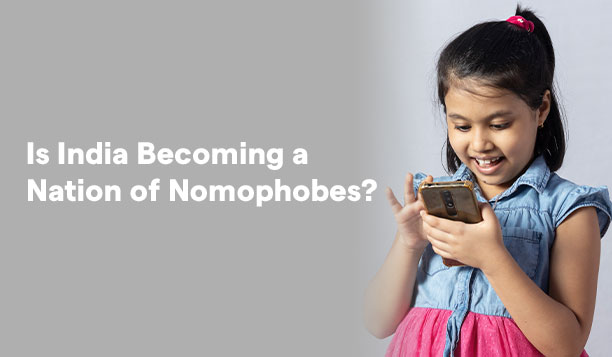
"Where is my phone?"
If this mere phrase is enough to provoke the sense of panic and the sudden urge to frisk your pockets, then trust us, you are not the only one giving out these reactions. This age of individuals being glued to their smartphones has led to the emergence of this new age terror known as Nomophobia: the state of fear or anxiety of being deprived of mobile phone contact. In a country where mobile phones have reached the point of continuity with our arms as an extension, it is important to analyze whether we are slowly becoming a nation of digital dependents?
Recent research states that the average amount of time an Indian spends on their smartphones is 7.3 hours per day, exceeding the usage patterns of the rest of the world. While affordable internet, cheap smartphones, and an endless supply of entertainment within reach have turned our screens into our constant companion, escape portals, and emotional support system, where exactly do these hidden triggers step into the picture? At what point does this dependence morph into addiction?
If losing your phone makes you anxious or if you're agitated because the battery power is running low, then you might be suffering from nomophobia, the most common habit across metro rides, college campuses, offices, and even family get-togethers, is our heads glued to our mobile screens.
Looking closely with an eagle’s eye demonstrates some reasons why we cannot function without our phones?
From Instagram reels to Twitter debates, Snapchat streaks, our Indian teens and adults have an abnormal obsession with staying "connected." That FOMO (fear of missing out) factor drives us to keep glancing at our notifications, with those hits of dopamine from likes and comments making it worse to log out altogether.
Every ping, like, and message discharges a minor amount of dopamine in your brain, the same chemical which links up with pleasure and addiction. Apps go through all the lengths to make it all the more difficult to put down one's phone.
Now, phones have crossed the threshold from communication devices to being safety nets. Whether it's through a WhatsApp family group or a virtual hangout with friends, the fear of being "out of the loop" compels us to check our devices.
From PUBG to Netflix, the range of digital enjoyment is limitless. The boundary between recreation and obsession seems to be fading. So many times you might have caught yourself saying, "Just one more episode" and ended up finishing an entire season?
With online classes, remote work, and digital payments, we would need our phones for almost everything. But is it necessary to check emails at midnight or to respond to work messages during dinner? Or after working hours?
Over time, frequent phone usage becomes a deeply ingrained habit. People unconsciously reach for their phones during idle moments, reinforcing the need to always have it accessible.
Some individuals use their phones as an escape from uncomfortable social situations, responsibilities, or emotional distress. This avoidance reinforces dependency and makes real-world interactions feel more stressful.
If a person does not have fulfilling offline activities (e.g., reading, sports, art), they are more likely to turn to their phone for entertainment, making digital disconnection uncomfortable.
Children raised with early smartphone access may develop dependency from a young age, leading to increased anxiety when away from their devices as they grow older.
Many people, especially younger users, tie their self-worth to online interactions. Likes, comments, and messages create a sense of validation, leading to compulsive phone use and anxiety when disconnected.
Despite knowing the facts about limiting the usage of our smartphones, we still get triggered by some of the signs that we must be aware of, such as:
Being connected has indeed its pros, but it is also cutting down your mental and physical health due to excessive phone usage, experts from the best psychiatrist hospital in Delhi suggest that individuals find themselves surrounded by some major setbacks such as:
Due to excessive exposure from the screens, it causes an average person anxiety, depression, or dissatisfaction with themselves. Furthermore, comparing our lives with unreal posts on Instagram or feeling pressured to respond within the given time makes them mentally drained.
Short reels and videos train our brains into craving instant gratification, making it impossible for us to focus on the long-term tasks that include reading books and even lengthy conversations.
Blue light from screens messes with the cycles of sleep of an individual, and sometimes ends up exhausting and suffering from insomnia. Scrolling late at night may seem calming, but it does a lot more damage than good, hampering the overall quality of life.
How many times do you ignore someone lecturing you because you're so obsessed with texting? Phones nowadays just take on the interpersonal aspect of the real world into a very personal relationship.
But do you know what is the best thing? We do not have to discard our telephones to exclude ourselves from this phobia. Yet what are the necessary steps that should be taken to build healthier digital habits?
India is a country with a very fast-growing digital economy and great connectivity, which brings along with it great responsibility. Hence, one must always try to strike the balance that will help embrace this technology without allowing it to consume oneself. On the one hand, we have technology, and on the other, we have smartphones which make our lives much easier. But when it starts controlling us rather than us controlling it, then it's time for a self-reveal to re-think the relationship we have with it.
So next time you see your hand reaching out to grab that phone, stop and ask yourself: Do I need it, or is it just habit? To gather more information about how India is becoming a nation of nomophobes, book an appointment at Sir Ganga Ram Hospital today.




